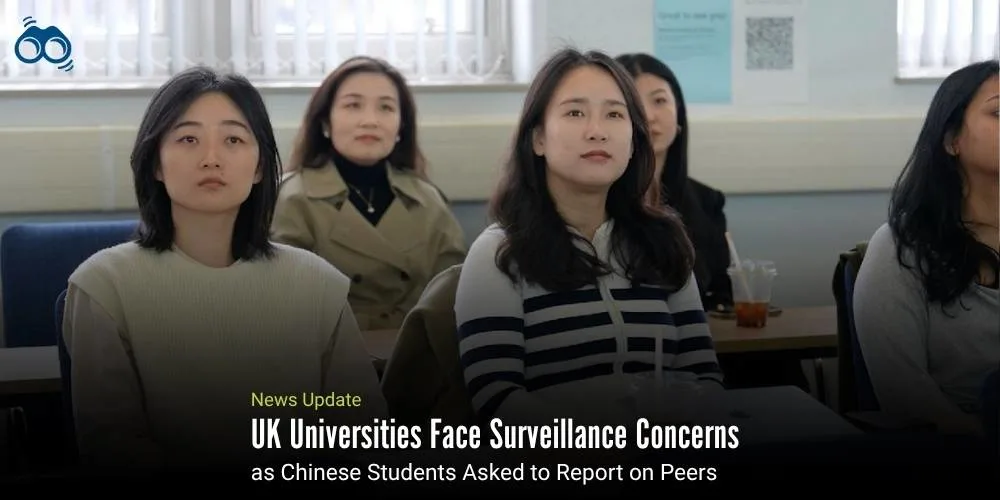Concerns Mount Over Foreign Influence on UK Higher Education Institutions
Report Claims Chinese Students Asked to Monitor Peers in UK Classrooms
In a development that has reignited concerns over academic freedom and institutional autonomy, a recent report by the UK-China Transparency (UKCT) think tank, cited by the BBC, has alleged that Chinese students studying in the United Kingdom are being encouraged by officials to monitor their peers and report on classroom discussions perceived as critical of China. Drawing on a survey of scholars specialising in China studies, the report further claims that some university lecturers have received warnings from Chinese authorities, advising them to avoid politically sensitive topics in their teaching. These revelations have prompted renewed debate over the extent of foreign influence within UK academic environments and the safeguarding of open discourse.
In response, the Chinese Embassy in London rejected the allegations, describing them as “groundless and absurd.” The embassy asserted that China respects freedom of speech and does not interfere in the internal affairs of other countries. Nevertheless, the timing of the report coincides with the UK’s recent introduction of legislation requiring universities to uphold academic freedom and free speech, particularly in the context of international partnerships.
The Office for Students (OfS), the sector’s regulator, emphasised that these freedoms are fundamental. Its Chief Executive, Susan Lapworth, reportedly stated that Confucius Institutes, which have long faced scrutiny, should be subject to review under the new rules due to ongoing concerns about foreign influence. UKCT also suggested that financial dependence on Chinese student enrolments may discourage some universities from confronting interference risks. According to the report, certain students informed lecturers that they had been instructed by officials to monitor classmates, while others expressed discomfort discussing sensitive topics such as China’s Xinjiang policies, the origins of COVID-19, and developments in the technology sector. Consequently, some students reportedly opted not to pursue further study in these areas.
Moreover, the report documented instances of harassment and intimidation targeting academics. Some researchers were allegedly denied visas to China, while others claimed their families had faced pressure due to their scholarly work in the UK. Additional accounts described intimidation by visiting Chinese scholars and individuals affiliated with Confucius Institutes. In light of these concerns, the Office for Students reaffirmed its authority to ensure universities protect freedom of speech, including from foreign interference. It announced forthcoming measures to establish a formal complaints system, allowing staff and guest speakers to report violations directly to the regulator. Institutions failing to meet these obligations could face financial penalties; one university has reportedly already been fined £585,000 this year.
Meanwhile, Universities UK, representing 141 institutions, stated that threats to staff or student freedom are taken seriously and that it continues to collaborate with the government to prevent such issues. A government spokesperson reiterated that all individuals studying or working at UK universities should be assured that their personal and academic freedoms are protected on British soil. Skills Minister Jacqui Smith affirmed that academic freedom is non-negotiable within UK institutions. She cautioned that any attempts by foreign states to intimidate or harass individuals in the UK would not be tolerated. Smith further noted that the newly enacted legislation clearly outlines universities’ responsibilities, and those failing to comply would face appropriate consequences. The report has intensified calls for vigilance and accountability, reinforcing the principle that academic freedom must remain inviolable within democratic societies.
Editor’s Note:
The UK-China Transparency (UKCT) report, cited by the BBC, raises serious concerns about the integrity of academic environments in UK universities. Allegations that Chinese students are being instructed to monitor peers and report on critical classroom discussions suggest a troubling intrusion into spaces meant for open inquiry. While the Chinese Embassy has denied these claims, the consistency of accounts from scholars and students cannot be dismissed lightly. At the core of this issue is the tension between international collaboration and institutional autonomy. UK universities benefit significantly from Chinese student enrolments, yet financial dependence must not compromise academic freedom. The report’s findings, ranging from surveillance to intimidation, highlight the need for universities to reassess the safeguards they have in place. The recent legislation mandating protection of free speech is a step forward, but enforcement is key. The Office for Students must be equipped to investigate and penalise breaches effectively. Universities, in turn, must ensure that foreign partnerships, including those with Confucius Institutes, are transparent and subject to regular review.
Skoobuzz asserts that universities must protect academic freedom from foreign influence by fostering open discussion of sensitive topics, providing clear reporting and support mechanisms, and upholding their role as spaces for critical thought. Diversifying international recruitment and including academic freedom clauses in agreements are crucial steps.














0 Comments (Please Login To Continue)